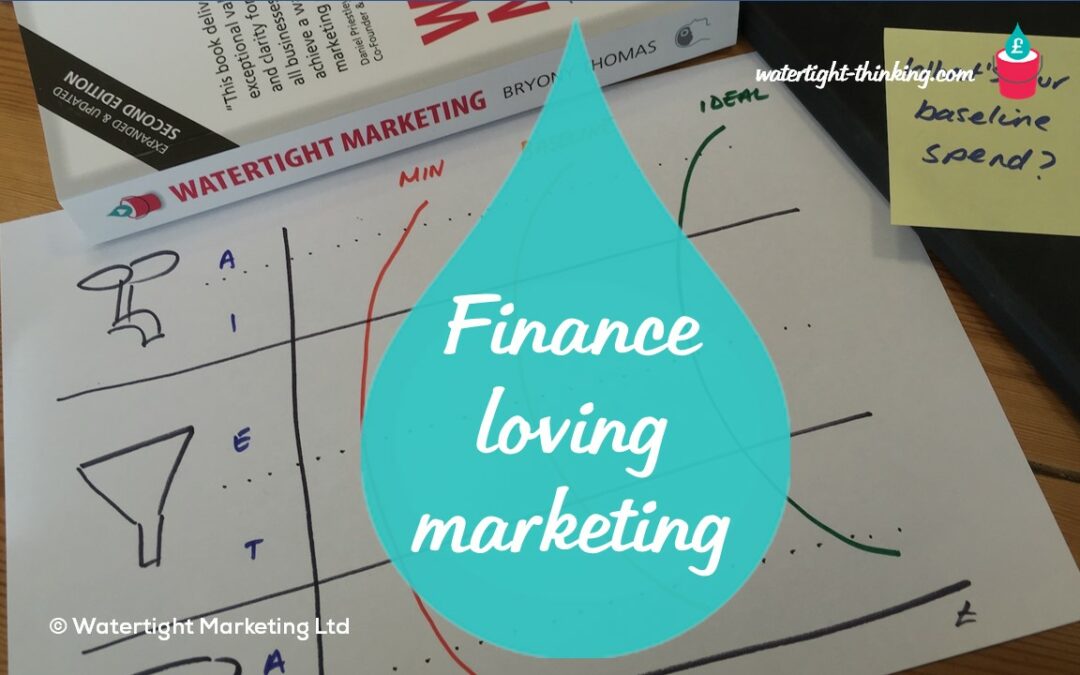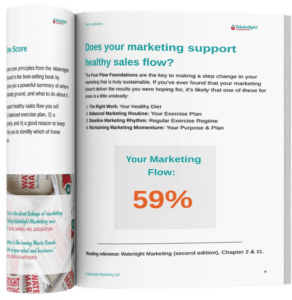Reading Time: 5 Minutes
Having a good relationship with finance is important. Getting them on-board and enthusiastically supporting your strategy and plan is often a key piece to get right. But all too often, finance think that marketing is solely there to spend money and view sales more warmly because they can see direct income from the fruit of their endeavours. ~ Rachael Wheatley | MD, Watertight Business Thinking
Listen to the session podcast here
51-minute roundtable discussion on getting your FD onboard and loving marketing
Read the write up here
10 – minute read. The write up from the round table discussion on getting your FD on board and loving marketing.
When I was working as a marketing lead in a business, I didn’t always have as close a relationship as I needed to with the FD. Indeed, finance doesn’t always think about marketing in a positive way.
Sometimes it’s to do with a difference in view.
I remember having a disagreement with one FD I worked with. She believed that profit should be an end goal. I argued that profit is what you get when you do something well (sell something people really want, delight your customers so they buy again); it’s a measure of success, not the end goal.
Sometimes it’s to do with misunderstanding.
What marketing might say is: “we want to create a really valuable piece of content, printed and sent to key contacts and shared widely on social media to get our advocates engaged.”
What FDs and finance might hear is: “we’re going to spend a pile of cash messing around with stuff we think is fun without any impact on the bottom line.”
Sometimes it’s to do with missing pieces.
That could include not being clear about what marketing your budget supports. You might not be sharing with finance the metrics you want to measure. We in marketing do not always help ourselves in this regard. We might put together a marketing budget having costed things out, but not be clear about why we’re recommending these activities or where in the customers’ journey it supports. We might even manage to save money on this year’s budget, making it harder to argue for an increase next year – unless you can draw a line directly from spend to outcomes.
Getting the whole leadership team on-board is important, as is building relationships with all of them. Doing so with FDs has its own challenges. Not all marketers feel comfortable with the language of finance, and you don’t want to look ill-informed by asking what you feel might be a silly question.
Link marketing to business objectives
Draw a line directly from what the business wants to achieve to the marketing and BD that will help make that happen. By doing that, it shows you do have an eye on the bottom line and that good marketing is essential to your success in finding, winning and keeping clients that nourish the business and the bank balance.
Education and learning
One of the things we often do at the beginning of working with leadership teams (finance included) is to run a team day which introduces marketing, what it’s about and why it’s important to a healthy business. An element of that session is to introduce them to the six marketing tasks.
See: Watertight Marketing, Chapter 1
These are marketing’s job description – what it needs to achieve. There’s a different marketing task for each step of a customer’s journey. If you ensure your FD knows what those steps and associated tasks and desired effects are, again, it becomes easier for them to see the rationale behind the marketing plan and what you want it to achieve. And it helps to avoid misunderstandings.
Plug the missing pieces
The two key missing pieces are budget and measurement. The questions that your FD will want answered are what, how much, when and importantly why. Share your plan with them and talk them through it. Let them ask questions to test and refine it. Then work with them to set up a measurement framework and agree between you what data you need to keep track and where that will come from. Linking a sales and marketing plan with properly articulated metrics adds weight to it.
Gaining the positive support from your FD helps build the relationship and your credibility within the business. Finance is a key skill for senior marketers; an effective marketing director is financially savvy, fully aligned with the financial goals of the business. Similarly, an effective FD is marketing savvy, fully aligned to marketing goals with a genuine understanding of its strategic value.

Rachael Wheatley
Managing Director, Watertight Thinking
Rachael brings over 30 years’ of marketing experience, with a particular focus on building and developing effective marketing teams that are able to act as a strategic driving force across an organisation. She has worked with Watertight since 2014 as a Master Practitioner and joined the business as MD in 2022.



Marketing is about business maths + creativity; if you don’t understand your marketing numbers it’s impossible to maximise your ROI on marketing spend. I discuss this in my recent book Business Maths Made Simple available from https://guilfordaccounting.thrivecart.com/business-maths-made-simple/